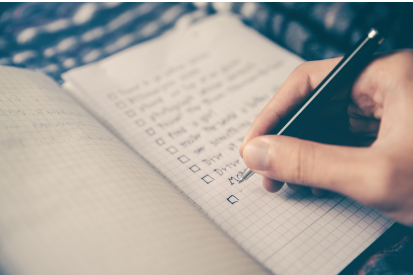We were leading busy lives with many commitments. We were making spring break plans, Easter gatherings, and just summer in general! Unexpectedly, things changed abruptly and everything was put on hold. It felt unexpected and upsetting. Some plans had to be canceled while some had to be revised. It is normal to feel a sense of loss with all the changes and feel the need to grieve what you thought this time of the year was going to be like. It can take a minute to accept what it actually is. The self-quarantine does not feel like a vacation when you didn’t plan for it and you can’t go anywhere. But now that you have nowhere to be, it might be the best time to be where your feet are. You can turn this time of self-quarantine into a life-changing self-discovery.
Self-discovery is the process of learning more about yourself and who you are.
While you will build a solid foundation, it is a process that keeps growing and changing. With a new discovery, you gain a new insight, awareness, and understanding about your authentic and true self. There are many benefits to personal growth and self-discovery. It can help you feel more confident and at peace. It can give your direction and a life meaning. You will feel more empowered and resilient. Having an understanding of yourself, your emotions, and your experiences can lead to deep and authentic acceptance. You can gain clarity that will break you free from cycle of denial, avoidance, and procrastination.
Here are three steps to self-discovery:
1) Feel your Feelings Self-discovery requires an exploration of emotions because you only know yourself to the extent that you know your feelings. The best way to gain insight is

through feeling your feelings.
Can you name your feelings? Can you notice when they arrive? Can you notice when they shift and become another emotion? Can you notice what triggers them or when they escalate or deescalate? Describe the physical sensations associated with an emotion. Name your emotions as often as you can.
It is important to know that emotions are not facts and they are always temporary even if they don’t feel that way. Every emotion that goes high will eventually subside. That’s why we always say: just ride the wave, you will eventually get to the shore.
In times of uncertainty, our fight, flight, or freeze response is triggered. Because there are a lot of unknowns and many things that are out of our control, it is normal if you have been staying in your pajamas all day. It is normal to freeze and not know how to handle it. There are mixed emotions. Some feel overwhelmed, depleted, and burnout. Some feel scared, lost, and panic. It can feel hard to regulate your emotions and find your calm and peace.
While learning to feel your feelings, it important to stay away from judgment and remain compassionate, curious, and kind. Given all the changes that have happened so rapidly with the Coronavirus and quarantine, remind yourself how much you have adopted, even if it was not easy. Notice how resilient you have already been. Give yourself credit and make room for all emotions no matter how different they may be.
2) Give your 2020 Vision Board a make-over!
There is a meme online that says, “This was not in my 2020 vision.” It’s true! Witnessing, experiencing, or being impacted by a pandemic definitely was not in anyone’s vision or a wish list. A lot has happened in the first 3 months of 2020. But this doesn’t mean you give up on 2020 or think vision boards are useless. You can turn this difficult time into a meaningful time.
Think about it, when was the last time, you invested in your self? When was the last time you spent time on yourself by figuring out who you are, how things have been for you, where you are in life, and what you wish for yourself for the future? For those that are laid off or asked to work from home, this is a good time to pause and reflect on your needs, aspirations, and goals.
𝐘𝐨𝐮 𝐜𝐚𝐧 𝐮𝐬e self-quarantine 𝐭𝐨 𝐫𝐞𝐯𝐢𝐬𝐞 𝐲𝐨𝐮𝐫 𝐯𝐢𝐬𝐢𝐨𝐧 𝐟𝐨𝐫 𝟐𝟎𝟐𝟎
𝘏𝘦𝘳𝘦 𝘢𝘳𝘦 𝘴𝘰𝘮𝘦 𝘲𝘶𝘦𝘴𝘵𝘪𝘰𝘯𝘴 𝘵𝘰 𝘦𝘹𝘱𝘭𝘰𝘳𝘦:
- What do you care about most?
- What have you always wanted to do but never had the courage to do?
- What is missing in your life?
- What are your true needs, wishes, and dreams?
- Which areas of your life are out of balance?
- Is it physical, emotional, social, spiritual, or occupational?
- What is one step you can take to have more balance?
3) Invest in a strong and solid self-care routine!
Once you truly get to know yourself, then you must treat it with love and care. A solid self-care routine will help to protect the discoveries you have made and also give you the break you need to make sure it is well-kept.

Before you start to create your self-care routine, take a moment and reflect on your beliefs around self-care. Write down any messages you received or observed that either criticized or rewarded self-care. Make sure to identify any of your unhealthy attitudes around self-care and challenge them before moving forward.
There are few important steps to consider when creating your ideal self-care routine:
1) Do your research: In order to create your self-care routine, you need to have an inventory of activities that you find pleasurable and relaxing. The key here is to know what will work for you, not what others are doing or what others will think of as the “right” self-care activities. You need to ask yourself, “What kind of activities help me feel (fill in the desired emotion)” such as calm, grounded, or happy. If you need some help, check out the bonus resource at the end of this handout.
2) Prioritize your self-care activities: You may look at your list of self-care activities and think, “I can’t do half the things here” because of the quarantine. This doesn’t mean that the list you created is useless. It just means you might have to be more creative. If you identify spending time with friends as your self-care routine, you will have to create virtual brunches or dinner with friends. If exercise and physical movement is a self-care activity, you will need to join virtual exercise classes until gyms are re-open. If prayer and spiritual practices are your preferred self-care routine, then you will need to join virtual church services. The goal is to stay engaged and connected. Remember, social distancing does not mean social-disconnection.
3) Start with small changes: To make your self-care routine a reality, it is not only important to prioritize but also start with small changes. Throughout your day take 5-minutes break from work or when kids are napping, to take a walk, get some fresh air, shower, text a friend or meditate. With practice, increase the duration. Again, make sure to check in with any thoughts you have that will sabotage this process. For example, if you are having a thought that says “how will 5-minute even help?” then you need to pause and challenge this thought. The truth is something is better than nothing & you need to simply start where you are.
4) Plan: We are coming to the final stages of setting up your self-care routine and in order to put all these planning into action, you need to create your schedule. Look at the self-care activities you decided to spend more time on, and ask yourself “when and where can I do it?” “Is there anything I am missing to get started on this self-care activity?” If you decide to start yoga, you will need yoga mat and some classes. If you decide to read book, then order some from Amazon. Make sure you have what you need to get started. Don’t forget to decide the time and the day for your self-care activities so that you don’t get distracted and stay on track.
Here are some self-care activities that will facilitate and support your path of self-discovery: Journal, Meditation, Practicing Gratitude, Learning a new language, Establishing a new self-care routine, Creating goals, Playing an old instrument, Writing, Drawing, Painting, Watching TED talk, Exploring YouTube videos, Cooking your favorite meal or something new; listening to podcast, praying, Visit a museum virtually, Writing a thank-you note to yourself, writing a bucket list, attending online therapy.
Despite everything, you will persevere. Because, You don’t need to just survive the self-quarantine; You can thrive! You can stand strong in the face of change and uncertainty.
Embracing You Therapy Group Practice
Here at Embracing You Therapy, we invite you to explore with us how life would be different if you had more control over your thoughts and emotions, and we invite you to consider that it is possible to accept things just as they are, embracing imperfections to create a gentler place for calm in your life.
Let’s learn what drives your unique perspective on anxiety and stress. Then, let’s find the tools-your unique tools-that help you respond to life in a healthy, calm way. Contact us today for your complimentary 15-minute phone consultation with one of our Client Care Coordinators.




